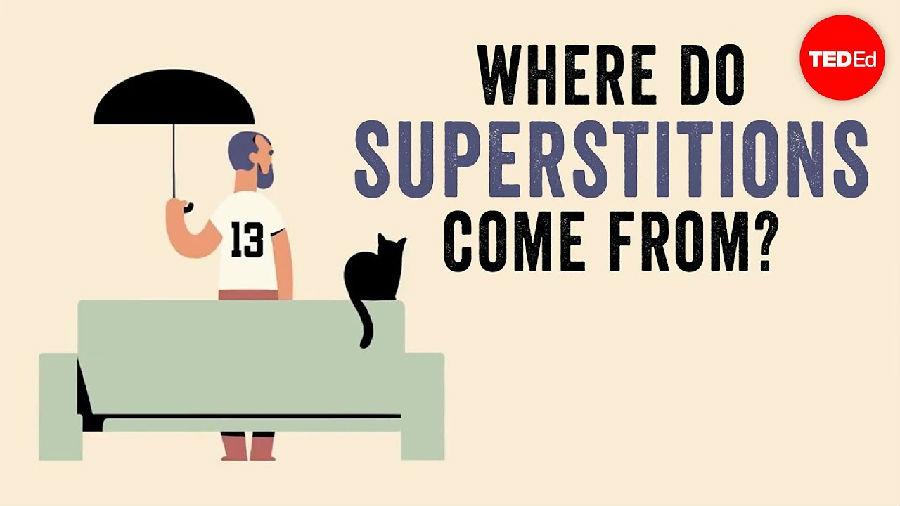原味人文风情:Are you afraid of black cats? Would you open an umbrella indoors? And how do you feel about the number 13?
你会害怕黑猫吗?你会在室内开伞吗?你对 13 这个数字有什么想法?
Whether or not you believe in them, you're probably familiar with a few of these superstitions.
不管你相不相信,你可能都很熟悉这些迷信。
So, how did it happen that people all over the world knock on wood or avoid stepping on sidewalk cracks?
那到底全世界的人是怎么开始敲敲木头,或是避免踩到人行道的缝隙的?
Well, although they have no basis in science, many of these weirdly specific beliefs and practices do have equally weird and specific origins.
虽然这些迷信都没有科学根据,许多这些特定得很奇怪的信念跟行为的确是有一样奇怪又特定的起源。
Because they involve supernatural causes, it's no surprise that many superstitions are based in religion.
因为它们包含了超自然因素,可想而知许多迷信奠基于宗教。
For example, the number 13 was associated with the biblical Last Supper, where Jesus Christ dined with his 12 disciples just before being arrested and crucified.
举例来说,13 这个数字常与圣经里的《最后的晚餐》联想在一起,耶稣基督在被捕与钉上十字架之前,就是跟他 12 个门徒吃这顿饭。
The resulting idea that having 13 people at a table was bad luck eventually expanded into 13 being an unlucky number in general.
一桌有 13 个人就代表不幸的这个想法最终演变成 13 通常就是个不幸运的数字。
Now, this fear of the number 13, called triskaidekaphobia, is so common that many buildings around the world skip the thirteenth floor,
现在,对 13 这个数字的恐惧,这被称为“13 恐惧症”,已经普遍到世界上许多建筑物会跳过第十三层楼,
with the numbers going straight from 12 to 14. Of course, many people consider the story of the Last Supper to be true,
数字直接从 12 跳到 14。当然,许多人认为最后的晚餐这个故事是真的,
but other superstitions come from religious traditions that few people believe in or even remember.
但其他迷信来自于少数人相信或甚至记得的宗教传统。
Knocking on wood is thought to come from the folklore of the ancient Indo-Europeans or possibly people who predated them,
一般认为,敲木头是来自古印欧人或更早之前的祖先流传下来的民间传统,
who believed that trees were home to various spirits. Touching a tree would invoke the protection or blessing of the spirit within.
这些人相信树木是各类神灵的家园。触碰树木能祈求树里神灵的保护或庇佑。
And somehow, this tradition survived long after belief in these spirits had faded away.
而不知怎么地,就算对这些神灵的信仰早已逸散,这个传统仍然留存了下来。
Many superstitions common today in countries from Russia to Ireland are thought to be remnants of the pagan religions that Christianity replaced.
许多现今在俄罗斯到爱尔兰普遍流传的迷信,都被认为是异教徒遗留下的,只是后来这些宗教都被基督教所取代。
But not all superstitions are religious; some are just based on unfortunate coincidences and associations.
但不是所有迷信都与宗教有关;有些就只是立基于不幸的事件跟联想。
For example, many Italians fear the number 17 because the Roman numeral XVII can be rearranged to form the word "VIXI," meaning "My life had ended."
举个例子,许多意大利人很害怕 17 这个数字,因为它的罗马数字符号 XVII 可以重新排列成 VIXI,意思是“我的生命结束了”。
Similarly, the word for the number four sounds almost identical to the word for death in Cantonese
同样地,数字 4 在广东话里听起来也几乎跟“死”这个字同音,
as well as languages like Japanese and Korean that have borrowed Chinese numerals.
且在受中文数字影响的日文以及韩文等语言里,也有这种谐音。
And since the number one also sounds like the word for must, the number 14 sounds like the phrase "must die."
而因为数字 1 也听起来像是“一定”,数字 14 听起来就像在说“一定死”。
That's a lot of numbers for elevators and international hotels to avoid.
电梯跟国际旅舍要避免的数字可真多。
And believe it or not, some superstitions actually make sense. Or, at least they did until we forgot their original purpose.
信不信由你,有些迷信是满合理的。或至少在我们忘记它们原本的起源之前,它们都是合理的。
For example, theater scenery used to consist of large painted backdrops, raised and lowered by stagehands, who would whistle to signal each other.
举例来说,剧院布景以前都是由大型绘制背景幕所组成,由舞台工作人员调整升降,他们会吹个口哨来跟另一边的工作人员沟通。
Absent-minded whistles from other people could cause an accident.
其他人无心的口哨声可能会导致意外发生。

But the taboo against whistling backstage still exists today, long after the stagehands started using radio headsets.
但在后台吹口哨的禁忌仍然流传到了今日,那是远在舞台工作人员开始用无线电耳机之后。
Along the same lines, lighting three cigarettes from the same match really could cause bad luck if you were a soldier in a foxhole,
同样地,用同一根火柴点三支烟可能真的会招来厄运,如果你是散兵坑里的一名士兵的话,
where keeping a match lit too long could draw attention from an enemy sniper.
在散兵坑里火柴点太久的话可能会引起敌军狙击手的注意。
Most smokers no longer have to worry about snipers, but the superstition lives on.
大多数抽烟的人不再需要担心狙击手,但这个迷信仍继续存在。
So, why do people cling to these bits of forgotten religions, coincidences, and outdated advice? Aren't they being totally irrational?
那为什么人们还是深信这些被遗忘的宗教、事件还有过时的建议呢?这样难道不是超不理智的吗?
Well, yes. But for many people, superstitions are based more on cultural habit than conscious belief.
嗯,是没错。但对许多人来说,比起一种有意识的相信,迷信更是种奠基于文化上的习惯。
After all, no one is born knowing to avoid walking under ladders or whistling indoors.
毕竟,没有人一生下来就知道要避免走在梯子底下或是避免在室内吹口哨。
But if you grow up being told by your family to avoid these things,
但如果你在成长过程中都被家人教导要避开这些事情,
chances are they'll make you uncomfortable even after you logically understand that nothing bad will happen.
很有可能做了这些事情会让你不太舒服,即使理智的你知道没有什么坏事会因此发生。
And since doing something like knocking on wood doesn't require much effort, following the superstition is often easier than consciously resisting it.
而且反正像是敲敲木头的动作也不费力,遵循这些迷信通常会比有意识地去避开它来得容易。
Besides, superstitions often do seem to work. Maybe you remember hitting a home run while wearing your lucky socks.
此外,迷信很多时候的确好像有用。你可能记得穿着你的幸运袜的时候打出了全垒打。
This is just our psychological bias at work. You're far less likely to remember all the times you struck out while wearing the same socks.
这只是我们被心理上的偏见所影响。你不太可能记得你穿同一双袜子被三振的次数。
But believing that they work could actually make you play better by giving you the illusion of having greater control over events.
但相信它们有用其实会让你表现得比较好,因为它给了你错觉,让你认为你有更好的掌控能力。
So, in situations where that confidence can make a difference, like sports, those crazy superstitions might not be so crazy after all.
所以在那种自信心会有所影响的情况里,像是运动,那些很疯狂的迷信到头来又好像没那么疯狂了。













